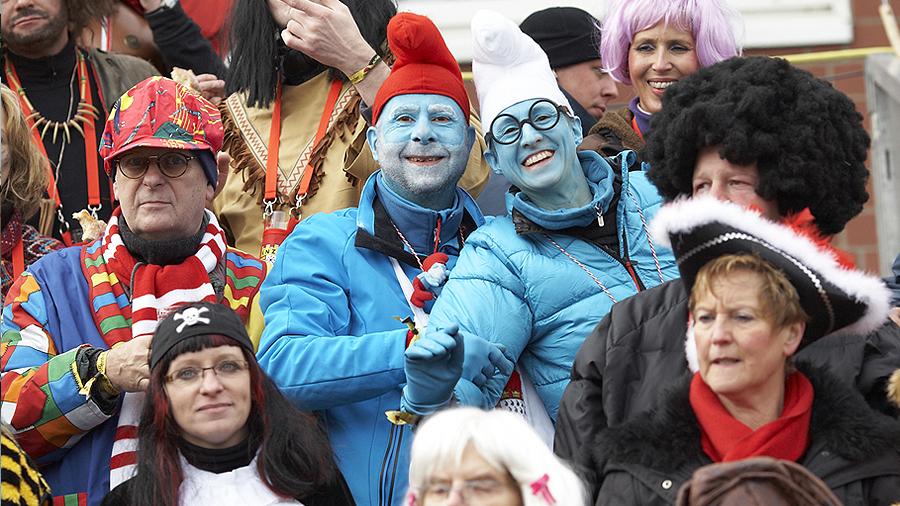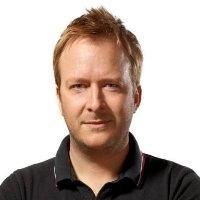It’s mid-morning on February 27, and thousands of people have gathered at the Severinstor, Cologne’s 12th-century city gatehouse on the south side of the German city. There are kids with face paint and crepe paper flowers in their hair; a group of adults and children are dressed as hearts, their faces painted red.
Elsewhere a woman in a bright red wig conducts a troupe of drummers and musicians decked out in blue, and there are hundreds of floats, including one that everyone is talking about: a large model of U.S. President Donald Trump dressed as a badly behaved schoolboy in a classroom of world leaders.
Marching band music blares loudly from speakers lining the street and the procession—down an almost four-mile route—begins with those on the floats throwing flowers and candy to the crowds. Welcome to the Cologne Carnival, one of the biggest in the world, where the motto for costumes is “the wilder, the better.”
A carnival has been celebrated in Cologne for centuries, but it was organized more formally after the French revolutionary troops quit the city in 1814. The Festordnendes Komitee (festival committee) was founded a decade later. It’s a huge, citywide event featuring more than 600 parties, balls and parades, put on by 160 different carnival societies, local clubs and neighborhood associations.
A phenomenal 30,000 people are involved in its organization each year, or are members of its affiliated clubs and societies—that’s 3 percent of the city’s population
Carnival season begins sharply at 11:11 a.m. on November 11, with a brief break for the Christmas period, and lasts until Ash Wednesday, the first day of Lent—dates that were determined by the festival’s Christian origins. The highlight of Carnival season is Rose Monday, two days before Ash Wednesday, which is when the grand parade takes over the town.
Heinz Schulz, who has been involved with the carnival for 15 years, says a lot of people remain on the parade route for six hours or more, before carrying on the party in one of the city's numerous taverns. “It’s about celebrating, drinking beer,” he says. Although there are hundreds of parties and side shows, the best part of the carnival experience is on the streets and in the city’s pubs. “You do not have to look for the parade because the parade is looking for you. It’s impossible to miss,” he says. “People lining the streets: children, horses, people in costumes, floats, everyone throwing sweets.”
As for Colognians themselves, they either love it or hate it, Schulz says. “But you have no chance of escaping it if you stay in the city.”
In 2008, the festival committee commissioned a consulting firm to study the social and economic impact of the carnival. It found that it brought in €460 million to the city each year. “That includes private parties, restaurants, ticket sales and hotels, which are completely booked,” Schulz says.
“You have to book a year or two in advance for Rose Monday, and if you want a hotel on the parade route you might as well book four or five years ahead.” But as he points out, the study was conducted nine years ago. “We estimate it’s increased massively since then. Today it's probably more like €500 million but we haven’t done a study since then. It's a tremendous boost to the city.”
In 2009, despite enduring the worst financial crisis since the 1930s, Cologne’s carnival attracted the same visitor numbers as it did the previous year—with 1.2 million people attending the Rose Monday procession alone.
Despite the variety of costumes you see attendees wearing at carnival, there is a theme. Members of carnival societies wear identical jackets, in their society’s colors, while the “Carnival Corps” wear uniforms mocking the Prussian rulers who took control of the city after the French occupation ended in 1814. The Colognians today are acknowledging the peaceful resistance of their people to an authoritarian regime all those years ago.
Schulz says Colognians believe there is a “champion’s league” of carnivals: Rio, Venice and Cologne. “If you ask people internationally what comes to mind when they think of the Germans having fun, they say Oktoberfest and Cologne Carnival.”As for networking, Schulz says companies and organizations invite clients and trading partners to come along to enjoy the festivities. “They sponsor it; they sponsor children marching and pay for costumes and candy.” But he says no branding is allowed in the carnival parade itself. “It’s never been commercial, and it should be as authentic as it can be.”
One thing that’s noticeably changed in recent years is security and safety, Schulz says. “We’re much more conscious these days. Somebody accompanies every horse, and there’s one person watching each wheel of each float to ensure nobody falls under them. We make sure the chocolates are not too heavy so they don’t hurt anyone when they’re thrown from the floats. It was a lot rougher and ready in the past—but that’s a sign of the times.”
As for security, Schulz says this has changed dramatically due to terrorist attacks in Europe. “Some of those attacks used heavy lorries, vans and trucks driving into crowds, so for the first time this year we saw a massive sealing-off of streets, police blocking off roads with trucks so nobody could drive a van into the city center during the parades. There were police with machine guns, which you didn’t see before. But we made it absolutely clear the Colognian people didn’t want it to stop them having their carnival. As long as security can be guaranteed, carnival will continue, so there’s a lot of cooperation between police and the carnival committee.”
He says despite the visible police presence—particularly on the outer ring of the city—those officers tasked with watching the carnival itself were incredibly friendly. “The closer you got to the parade, you saw officers with lipstick all over their faces, where they’d been kissed by carnival-goers; others were holding bunches of flowers they’d been given.”
In Conclusion
Héctor Venegas, MPI Germany Chapter president and Cologne resident, says Carnival is what his city is all about.
“It’s in the genes of everybody who lives there,” he says. “It’s in our songs, the language. The songs we’re taught from childhood are usually carnival songs. Every boy and girl born there learned the language through the songs of carnival.
“People go crazy about it. The city is packed. And during carnival, nobody’s working. Everybody’s outside. Companies just shut for the season. I employ 22 people and no one wants to be at work, so everyone goes to carnival instead.” But, Venegas insists, it’s actually good for business—because people you would normally just associate with professionally are suddenly joining you for a beer. “They become your pal,” Venegas says. “You experience carnival together, drink alcohol, relax and chat in a more personal way.”



